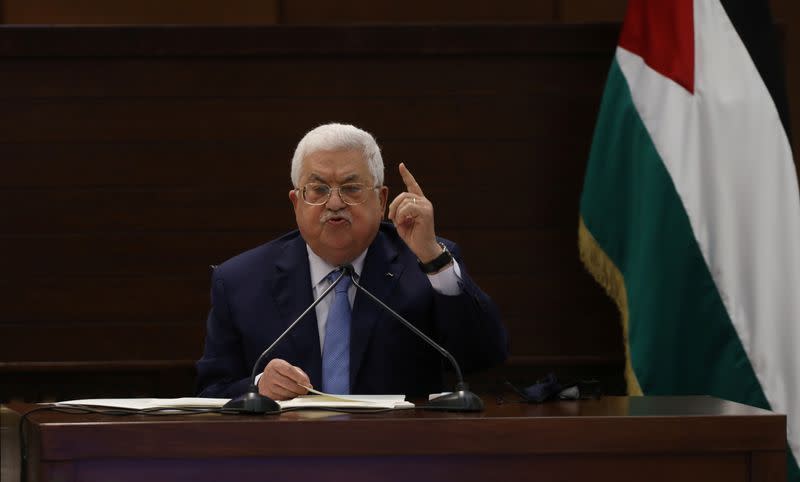By Ali Sawafta and Rami Ayyub
RAMALLAH, West Bank (Reuters) – Facing elections for the first time in 15 years, Palestinian President Mahmoud Abbas is battling a growing divide in his powerful Fatah party, which poses a new threat to his dominance over Palestinian politics.
The offer by one of Abbas’s party allies has heightened speculation that he may cancel a presidential vote planned for July, fearing a potential challenge from Marwan Barghouti, a popular Palestinian leader arrested by Israel.
Abbas’ office denies that he has any plans to delay or cancel the presidential vote.
Barghouti, now 61, was a driving force in the 2000-2005 Palestinian uprising in the Israeli-occupied West Bank and Gaza Strip. He was sentenced by an Israeli court in 2004 to life imprisonment after being convicted of several lethal attacks on Israelis by Palestinian militants. Barghouti has always denied the charges.
Abbas, 85, has governed the Palestinian Authority (PA) in areas of self-government in the West Bank by decree for more than a decade. In January, he announced presidential and legislative ballots – a move widely seen as a response to domestic and Western criticism of his presidential democratic legitimacy.
Adding to this criticism is Nasser al-Qudwa, a longtime member of the main Fatah Central Committee, who last week announced that he was forming a new list that would run separately from Fatah in the May legislative elections.
“(Palestinians) are fed up with the current situation … internal behavior or bad behavior, things like the absence of the rule of law, the absence of equality, the absence of justice,” said Qudwa, nephew of the late founder of Fatah and O leader of the Palestine Liberation Organization, Yasser Arafat, told Reuters.
It is rare for leaders of the 19 members of the Central Committee to publicly break with Abbas.
Qudwa, 67, said he expected his list to be led by Barghouti, a Fatah leader long considered a potential successor to Abbas.
Barghouti did not say whether to enter the list or run for the presidential election. He and his lawyer declined a request to interview him. But opinion polls suggest he would comfortably beat Abbas and leaders of Hamas, the Islamic movement that took control of Gaza from Fatah in 2007.
Abbas aides note that the split with Hamas has contributed to the long delay in holding new elections.
FATAH DISCORD
Abbas tried to resolve the disagreement by sending a legalist to visit Barghouti in prison and, through emissaries, preaching party unity after Qudwa announced his new list.
“Fatah, with strength and power, will run together in the next democratic elections to strengthen democracy, maintain the project of national liberation and protect Palestinian national unity,” wrote Hussein al-Sheikh, Abbas’ Minister of Civil Affairs, on Facebook.
Palestinian officials questioned in particular how Barghouti would contest the elections in prison and what would happen if he won. Any move to free him would likely unleash a political storm in Israel.
Two Western diplomats told Reuters that European countries are asking Abbas not to back down on his electoral pledge.
“There is a concern that he (Abbas) may see a middle ground to allow legislative elections to proceed, but to postpone or cancel the presidential election,” said one.
Abbas is expected to convene a meeting of the Fatah Central Committee on Monday, where he will formally sanction Qudwa.
Qudwa told Reuters he does not plan to attend committee meetings.
It was not immediately clear how much support the Qudwa list would get. About 250 Palestinians attended a Zoom conference call that he held last week to announce the change.
The last parliamentary vote by the Palestinians in 2006 resulted in a surprise victory for Fatah’s main rival, Hamas. This created a split that deepened when the Islamic group snatched military control of Gaza from the Fatah-led PA, two years after Israel removed settlers and soldiers from the territory.
The elections are part of a broader effort for reconciliation between Fatah and Hamas, seen as vital to building broad popular support for any future state negotiations with Israel, frozen since 2014.
Party lists for legislative voting must be completed by March 20.
(Written by Rami Ayyub; Editing by Jeffrey Heller and Mark Heinrich)
